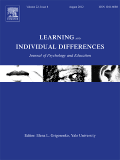
LEARNING AND INDIVIDUAL DIFFERENCES
Scope & Guideline
Decoding the impact of individual variation on learning outcomes.
Introduction
Aims and Scopes
- Individual Differences in Learning:
The journal emphasizes the study of how individual characteristics, such as cognitive abilities, personality traits, and socio-emotional factors, affect learning processes and outcomes. - Cognitive and Emotional Factors:
Research on the interplay between cognitive functions (like executive functions and metacognition) and emotional aspects (such as motivation and anxiety) is a core focus, exploring how these dimensions influence educational performance. - Educational Interventions and Strategies:
The journal publishes studies evaluating the effectiveness of various pedagogical interventions and strategies aimed at enhancing learning, especially for diverse learner populations. - Cross-Cultural Studies:
There is a significant interest in cross-cultural research that examines how cultural contexts shape learning experiences and individual differences in educational environments. - Developmental Perspectives:
The journal includes research on developmental trajectories in learning, addressing how individual differences evolve over time and impact educational transitions.
Trending and Emerging
- Gamification and Engagement Strategies:
Recent studies are exploring the impact of gamification and innovative engagement strategies on learning outcomes, indicating a trend towards integrating technology and game-like elements in educational practices. - Social-Emotional Learning (SEL):
There is a significant increase in research addressing the role of social-emotional learning and its impact on academic performance and well-being, reflecting a broader understanding of what constitutes effective learning. - Cultural and Contextual Influences:
Emerging themes focus on how cultural contexts and individual backgrounds influence learning processes, showcasing an increased interest in diversity and inclusion in educational research. - Interdisciplinary Approaches:
The journal is seeing a rise in interdisciplinary research that combines insights from psychology, education, and neuroscience to better understand learning mechanisms and individual differences. - Longitudinal Studies of Learning Trajectories:
An increasing number of publications are utilizing longitudinal designs to examine learning trajectories over time, providing deeper insights into how individual differences develop and affect educational outcomes.
Declining or Waning
- Traditional Cognitive Models:
Research centered solely on traditional cognitive models without integrating socio-emotional or contextual factors appears to be declining, as newer studies emphasize a more holistic approach to understanding learning. - Static Assessments of Learning Styles:
There has been a noticeable reduction in studies focusing on static assessments of learning styles, as the field moves towards more dynamic and contextualized approaches to understanding learner variability. - Generalized Educational Outcomes:
Papers that focus exclusively on generalized educational outcomes without considering individual differences or specific contexts are becoming less common, indicating a shift towards more nuanced analyses.
Similar Journals

CONTEMPORARY EDUCATIONAL PSYCHOLOGY
Advancing Insights in Educational PsychologyCONTEMPORARY EDUCATIONAL PSYCHOLOGY, published by Academic Press Inc. Elsevier Science, stands as a leading journal in the fields of developmental and educational psychology. With an impressive impact factor and ranked in the Q1 category for both Developmental and Educational Psychology and Education, it is recognized as a top resource for researchers and professionals seeking to explore the complexities of learning, development, and educational practices. The journal has been disseminating groundbreaking research since 1976 and continues to be relevant through 2024, showcasing innovative studies that inform educational theory and practice. Although the journal operates under a subscription model, it provides unparalleled insights and comprehensive reviews that cater to a diverse audience, including researchers, educators, and students. The rigorous peer-review process guarantees the high quality of published work, while its Scopus rankings affirm its significant contribution to the academic community, with standout positions in both the fields of social sciences education and developmental psychology. For those committed to advancing the intersection of psychology and education, CONTEMPORARY EDUCATIONAL PSYCHOLOGY is an indispensable scholarly resource.

MEMORY & COGNITION
Illuminating the Pathways of Memory and CognitionMEMORY & COGNITION is a premier journal published by SPRINGER, dedicated to advancing the understanding of cognitive processes related to memory. Established in 1973, this esteemed journal covers a wide range of topics within the fields of experimental and cognitive psychology, neuropsychology, and physiological psychology, cementing its status as a leading voice in the arts and humanities. With an impressive impact factor and a consistent Q1 ranking across multiple categories, MEMORY & COGNITION attracts high-quality research that elucidates the intricacies of memory function and cognition. The journal is nestled within the competitive landscape of academic publishing in the United States and maintains robust accessibility options, inviting both quantitative and qualitative analyses from researchers, professionals, and students alike. By fostering interdisciplinary dialogue and collaboration, this journal plays a pivotal role in shaping the future of cognitive research, making it an invaluable resource for its readership.

EDUCATIONAL PSYCHOLOGY REVIEW
Advancing Knowledge in Educational PsychologyEDUCATIONAL PSYCHOLOGY REVIEW is a premier journal published by Springer/Plenum Publishers, dedicated to advancing the field of educational psychology through rigorous scholarship and innovative research. Since its inception in 1989, this influential journal has played a pivotal role in disseminating high-quality research findings and theoretical insights, helping to shape the future of educational practices and psychological frameworks. With an impressive impact factor and a place in the Q1 quartile in both Developmental and Educational Psychology as well as Education, it ranks among the top journals in its field. Recent Scopus rankings further highlight its significance, placing it in the 99th percentile among education publications and the 98th percentile in developmental psychology. Although it is not an open-access journal, it maintains a strong commitment to accessibility through institutional subscriptions and partnerships. The EDUCATIONAL PSYCHOLOGY REVIEW invites researchers, professionals, and students alike to contribute and engage with the latest findings, fostering a deeper understanding of psychological principles in educational contexts.
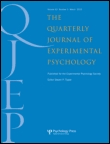
QUARTERLY JOURNAL OF EXPERIMENTAL PSYCHOLOGY
Transforming Understanding Through Empirical StudiesQuarterly Journal of Experimental Psychology, published by SAGE Publications Ltd, is a leading peer-reviewed journal that serves as a vital resource in the fields of experimental and cognitive psychology, neuropsychology, and medicine. With an impactful contribution to psychological research, the journal is recognized for its rigorous methodology and empirical studies, holding a notable ranking among its peers—finding itself in the Q2 quartile across several categories. With its origin tracing back to 2006, Quarterly Journal of Experimental Psychology significantly influences the academic discourse until its latest published findings in 2024. Catering to a diverse audience of researchers, professionals, and students, this journal provides Open Access options, enhancing the reach and accessibility of cutting-edge psychological research. By focusing on innovative approaches and findings, it aims to bridge theoretical understanding with practical application, hence fostering advancement in multiple related disciplines. For those committed to understanding the complexities of human behavior and cognitive processes, this journal remains an essential reference point.
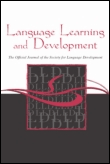
Language Learning and Development
Fostering dialogue on contemporary issues in language development.Language Learning and Development, published by Routledge Journals, Taylor & Francis Ltd, is a premier academic journal that stands at the forefront of research in the fields of education and linguistics. With a robust ISSN of 1547-5441 and E-ISSN 1547-3341, this journal not only boasts an impressive Q1 classification in both Education and Linguistics for 2023 but also ranks favorably in Scopus metrics, highlighting its significance in advancing scholarship. Situated in the United Kingdom, it focuses on the intersection of language acquisition, cognitive development, and pedagogical practices, making it an essential resource for researchers, educators, and students alike. Given its commitment to publishing rigorous research articles, Language Learning and Development aims to foster dialogue and explore innovative methodologies in language learning, providing an invaluable platform for contemporary issues and advancements in this dynamic field.

Psicologia Educativa
Pioneering Research in the Intersection of Psychology and EducationPsicologia Educativa is a renowned academic journal dedicated to the field of educational psychology, published by the COLEGIO OFICIAL PSICOLOGOS MADRID. Since its initiation in 1995, this open access journal has become a significant platform for researchers and practitioners who seek to advance the scientific understanding of psychological principles in educational settings. With an impressive impact factor and recognition within the academic community—ranking in the Q3 quartile for Developmental and Educational Psychology and Q2 for Social Psychology in 2023—Psicologia Educativa is well-positioned to publish influential research that informs educational practices. The journal's scope spans a variety of topics within educational psychology, facilitating critical dialogue and innovative approaches in the realm of social interaction and development learning processes. By providing wide access to scholarly articles, it serves as an essential resource for students, researchers, and education professionals eager to contribute to the ever-evolving field of psychology.
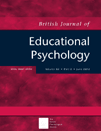
BRITISH JOURNAL OF EDUCATIONAL PSYCHOLOGY
Transforming educational practices through research.The British Journal of Educational Psychology (BJEP), published by Wiley, stands as a leading platform in the fields of Developmental and Educational Psychology and Education. Since its inception in 1931, BJEP has consistently delivered high-quality, peer-reviewed research that addresses critical issues and advances knowledge within the educational sphere. With a commendable impact factor and a prominent Q1 ranking in both the Developmental and Educational Psychology categories, the journal boasts an impressive standing among its peers, reflected by its rankings in Scopus (Rank #101 out of 1543 in Social Sciences – Education and Rank #35 out of 360 in Developmental Psychology). Researchers, educators, and students alike will find valuable insights and innovative practices that shape learning and teaching in diverse contexts. Although currently not available as open access, the journal remains dedicated to disseminating pivotal findings that contribute to effective educational psychology practices worldwide. Explore the rich tapestry of knowledge that BJEP offers, crafted from contributions across the globe at the forefront of educational research.
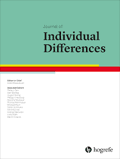
Journal of Individual Differences
Advancing Insights into Individual VariabilityThe Journal of Individual Differences, published by HOGREFE PUBLISHING CORP in Germany, delivers critical insights into the diverse psychological and neuroscientific factors that define individual variability. With an ISSN of 1614-0001 and an E-ISSN of 2151-2299, this journal aims to foster research that illuminates the complexities of human behavior through the lens of individual differences, making it an essential resource for both researchers and practitioners in the fields of psychology and biological psychiatry. The journal's notable ranking in 2023 includes Q4 in Biological Psychiatry and Q3 in miscellaneous Psychology categories, reflecting its commitment to advancing knowledge in these critical areas. Spanning from 2005 to 2024, it serves as a platform for original research, theoretical articles, and reviews that are not only timely but also pivotal for understanding the intricate tapestry of human cognition and emotion. As an indispensable tool for those seeking to deepen their understanding of psychological diversity, the Journal of Individual Differences invites contributions from a broad spectrum of disciplines, ensuring a comprehensive approach to its impactful studies.

Educational and Developmental Psychologist
Elevating discourse in developmental and educational psychology.The Educational and Developmental Psychologist is a premier journal dedicated to advancing research and practice in the fields of educational and developmental psychology, published by Taylor & Francis Ltd. With an ISSN of 2059-0776 and an E-ISSN of 2059-0784, this journal has established itself as a key resource for researchers and practitioners alike, providing a platform for innovative studies that bridge theory and application. With a 2023 Scopus ranking placing it in the top 73rd percentile in Education and 58th in Developmental Psychology, it highlights significant findings that are shaping educational practices globally. Operating from the United Kingdom, this journal is committed to disseminating high-quality, peer-reviewed research that is crucial for professionals addressing the challenges encountered in educational settings. Although it is not an open-access journal, its impact on educational psychology is noteworthy, reflecting rigorous standards in its publication process. The journal's scope encompasses a wide variety of topics, promoting an interdisciplinary dialogue that is essential for the advancement of knowledge in education.

JOURNAL OF CREATIVE BEHAVIOR
Exploring the Depths of Creative ExpressionJOURNAL OF CREATIVE BEHAVIOR, published by WILEY, stands as a leading academic platform dedicated to the exploration and dissemination of research within the realms of creativity, education, and the visual and performing arts. With its inception in 1967, this journal has continuously evolved, boasting an impressive scope that invites interdisciplinary approaches to understanding creative processes across various domains. As evidenced by its Q1 ranking in both Education and Visual Arts and Performing Arts, as well as a Q2 ranking in Developmental and Educational Psychology, the journal holds a significant position in its field, publishing high-impact research that often influences educational practices and artistic methodologies alike. Researchers and professionals will benefit from its selective content, which is well-regarded in academic circles, as reflected by its impressive Scopus rankings: it ranks in the 99th percentile in Visual Arts and Performing Arts, and remains a vital resource for students and scholars seeking to delve into the complexities of creative behavior. While the journal is not open access, it continues to serve as an essential repository of knowledge that fosters the development of innovative thinking and pedagogical advancement.